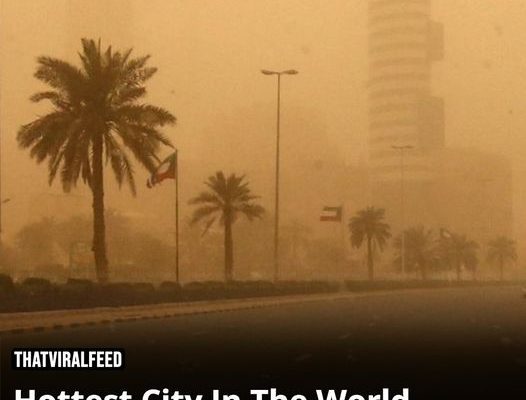This Middle Eastern city is intense, almost like something out of the Old Testament.
Like many of Britain’s seaside towns, this place has seen better days recently, but for reasons that might seem strange to those who enjoy strolling along the UK’s scenic coasts.

While some of the UK’s coastal areas have lost their Victorian charm and now have amusement arcades and run-down shops, Kuwait City has simply become too hot.
On July 21, 2016, the Mitribah weather station in northern Kuwait recorded a temperature of 54C (129F) – the third-highest ever recorded globally.
Compared to the recent scorching Cerberus Heatwave in Europe, which was 10C cooler, Kuwait’s heat dwarfs Europe’s highs.
Climate scientists warn that Kuwait is heating up faster than the rest of the world, with temperatures expected to rise by 5.5C (10F) by the end of the century compared to the 2000s.

In 2021, temperatures above 50C (122F) were recorded for 19 days, a record that may be broken this year.
The country is also experiencing less rain each year, leading to more frequent and severe dust storms.
Temperatures reaching 50C (122F) aren’t just uncomfortable, they’re hazardous, surpassing the body’s safe limits by 13C (55F).

Prolonged exposure can cause serious health problems like heat exhaustion, heart issues, and even death.
Wealthy individuals now prefer staying indoors in air-conditioned homes, offices, or shopping malls to avoid the extreme weather.
A study from 2020 revealed that about two-thirds (67%) of all electricity consumed in homes is attributed to continuous operation of air conditioning units.

Joshua Wood highlighted in ExpatsExchange the “high quality of life” in this “modern, luxurious, and safe” country, but cautioned about the extreme heat, describing it as “very hot” from May to September and “insanely hot” in June, July, and August.
Migrant workers, predominantly from Arab, South, and Southeast Asian countries, make up approximately 70% of Kuwait’s population.
These workers fill the hot public buses of the capital city and crowd its streets.
The study suggests that by the end of the century, climate change could increase heat-related deaths by 5.1% to 11.7% across the entire population, with potentially higher impacts of up to 15% among non-Kuwaiti residents.
While neighboring countries have committed to substantial emissions reductions, Kuwait’s promises fall short. During COP26, the country pledged a modest emission reduction target of 7.4% by 2035.
Because much of Kuwait’s electricity costs are subsidized by the government, there’s little incentive for people to conserve energy.
Environmental expert Salman Zafar warns of serious consequences from global warming for Kuwait, including floods, droughts, depletion of aquifers, coastal inundation, frequent sandstorms, biodiversity loss, ecosystem damage, threats to agriculture, and disease outbreaks.



